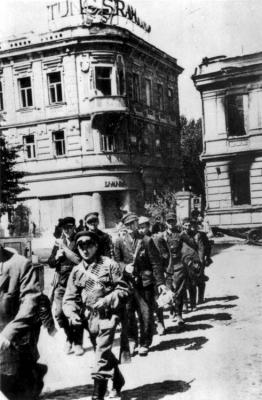When Lithunia (including Vilna) was annexed to the Soviet Union in July 1940, the Zionist youth movements in Vilna were forced to go underground. When the Germans occupied Vilna in June 1941, these movements worked to save their comrades during the Aktions. At the end of 1941, there were still many Jews in the ghettos of Belarus and the Generalgouvernement, but most of the Jews in Vilna had already been murdered. On 31 December 1941, some 150 members of pioneer youth movements in the Vilna ghetto assembled and heard Abba Kovner's stirring speech, "We shall not go like sheep to the slaughter." The Jewish youth were called upon to prepare for an armed struggle against the Germans.
Several weeks later, the United Partisans Organization (FPO) was established in order to offer armed resistance on liquidation of the ghetto, and to disseminate the idea of resistance amongst other ghettos. They sent couriers to the Grodno, Bialystok and Warsaw ghettos with news of the extermination of the Jews of Vilna and Lithuania as a whole. The FPO had approximately 300 members, most of them armed. They would leave the ghetto to booby-trap trains and sabotage German equipment and ammunition.
In the spring of 1943, small ghettos and labor camps in the vicinity of Vilna were liquidated. The FPO stepped up the smuggling of arms into the ghetto, and made contact with partisans in the forests west of Belarus. In July, an FPO partisan base was set up in the Naroch Forest, some 80 km east of Vilna.
On 1 September 1943, during the roundup for deportation to Estonia, the FPO called on the Jews to ignore the deportation order, and even used arms against the Germans in the ghetto. The Jews of the ghetto did not join the uprising, and as a result, the FPO halted its battle within the ghetto and started to smuggle its members out to the Naroch and Rudniki forests. On 23 September, the day the ghetto was liquidated, the last group of 100 FPO members left the ghetto via the sewers led by Abba Kovner. Some 700 young Jews from the ghetto joined the partisans in the forests, where they fought until the arrival of the Red Army, and participated in the liberation of Vilna on 13 July 1944.
After liberation, some 6,000 Jews gathered in Vilna, including partisans, Jews who had assumed the identity of Christians, Jews coming out of hiding, and the first survivors from the camps in Estonia. Later on, Jews also returned to Vilna from the Soviet Union.
Yad Vashem Photo Archives 1644







